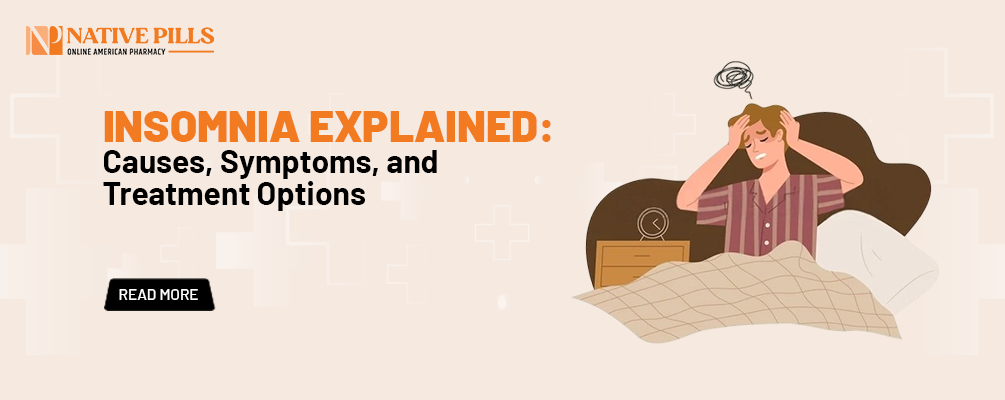Insomnia is a common sleep disorder characterized by persistent difficulties in falling asleep, staying asleep, or waking up too early and being unable to return to sleep. Despite having adequate time and opportunity for rest, individuals with insomnia often feel unrefreshed upon waking. It’s important to note that insomnia is not considered a disease itself, but rather a symptom of other underlying issues.
People suffering from insomnia often experience daytime consequences such as fatigue, irritability, mood swings, difficulty concentrating, and reduced performance in daily tasks.
Types of Insomnia
Insomnia is generally categorized based on its duration and root cause:
-
Acute Insomnia: Short-term and typically triggered by stress, life changes, or a specific event. It usually lasts a few days or weeks.
-
Chronic Insomnia: Long-lasting (occurring at least three nights per week for three months or longer) and often linked to underlying health or psychological issues.
Causes of Insomnia
Insomnia can be triggered by various psychological, physiological, and environmental factors. These often overlap and may influence one another:
1. Psychological Factors
-
Stress
-
Anxiety
-
Depression
-
Post-traumatic stress disorder (PTSD)
-
Racing thoughts or emotional distress
2. Medical and Physiological Conditions
-
Chronic pain (e.g., arthritis, fibromyalgia)
-
Respiratory issues (e.g., asthma, sleep apnea)
-
Hormonal imbalances (e.g., menopause, hyperthyroidism)
-
Neurological disorders (e.g., Parkinson’s disease, Alzheimer’s disease)
-
Gastrointestinal issues (e.g., acid reflux)
3. Environmental and Lifestyle Factors
-
Noisy or uncomfortable sleeping conditions
-
Exposure to light or extreme temperatures
-
Irregular sleep schedules due to shift work or jet lag
-
Excessive caffeine or stimulant use
-
Late-night screen time and blue light exposure
-
Lack of physical activity or inconsistent routines
4. Stressful Life Events
Major events such as job loss, divorce, bereavement, or financial difficulties can increase emotional distress, leading to or worsening insomnia.
Symptoms of Insomnia
The hallmark symptoms include:
-
Difficulty falling asleep
-
Waking up frequently during the night
-
Waking too early and being unable to fall back asleep
-
Feeling unrefreshed or tired despite sleeping
Daytime effects of insomnia may involve:
-
Fatigue or low energy
-
Poor concentration and memory
-
Mood disturbances (e.g., irritability, anxiety, depression)
-
Reduced performance at work or school
-
Impaired quality of life
Treatment for Insomnia
Effective treatment depends on the cause and severity. Options include both non-medication and medication-based therapies:
1. Sleep Hygiene
Improving sleep habits and creating a sleep-friendly environment:
-
Keep a consistent sleep schedule
-
Avoid screens before bedtime
-
Make the bedroom dark, quiet, and cool
-
Limit caffeine and alcohol intake
2. Cognitive Behavioral Therapy for Insomnia (CBT-I)
This is the gold standard treatment. It addresses the thoughts and behaviors that interfere with sleep and includes:
-
Sleep restriction
-
Stimulus control
-
Relaxation training
-
Cognitive restructuring
3. Medications (Short-Term Use)
If needed, a healthcare provider may prescribe:
-
Ambien (zolpidem)
-
Belsomra (suvorexant)
-
Butisol (butabarbital)
-
Triazolam
Note: These medications should be used only under a doctor’s guidance and are typically reserved for short-term use due to potential dependency and side effects.
4. Treat Underlying Conditions
Addressing and managing medical or psychological issues like chronic pain, depression, or anxiety can significantly improve sleep.
5. Lifestyle Modifications
-
Regular physical activity (avoid exercising too close to bedtime)
-
Limiting naps during the day
-
Stress management techniques (e.g., meditation, yoga, therapy)
Prevention and Long-Term Management
Preventing and managing insomnia requires a holistic approach:
-
Maintain consistent sleep routines
-
Practice good sleep hygiene
-
Address stress and emotional health proactively
-
Seek professional help when needed
CBT-I remains the most effective long-term treatment, while medications may provide short-term relief. Consultation with a doctor or sleep specialist is vital for accurate diagnosis and personalized treatment planning.

